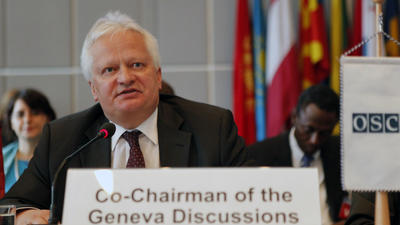-
Our work
-
Fields of work
- Arms control
- Border management
- Combating trafficking in human beings
- Conflict prevention and resolution
- Countering terrorism
- Cyber/ICT Security
- Democratization
- Economic activities
- Education
- Elections
- Environmental activities
- Gender equality
- Good governance
- Human rights
- Media freedom and development
- Migration
- National minority issues
- Policing
- Reform and co-operation in the security sector
- Roma and Sinti
- Rule of law
- Tolerance and non-discrimination
- Youth
- Field operations
- Projects
-
Meetings and conferences
- Summit meetings
- Review Conferences
- Ministerial Council meetings
- Plenary meetings of the Permanent Council
- Plenary Meetings of the Forum for Security Co-operation
- Security Review Conferences
- Annual Implementation Assessment Meetings
- Economic and Environmental Forum
- Economic and Environmental Dimension Implementation Meetings
- Human rights meetings
- Media conferences
- Cyber/ICT security conferences
- Conference of the Alliance against Trafficking in Persons
- Gender equality conferences
- Annual OSCE Mediterranean conferences
- Annual OSCE Asian conferences
- Partnerships
-
Fields of work
-
Countries
- All
-
Participating States
- Albania
- Andorra
- Armenia
- Austria
- Azerbaijan
- Belgium
- Belarus
- Bosnia and Herzegovina
- Bulgaria
- Canada
- Croatia
- Cyprus
- Czechia
- Denmark
- Estonia
- Finland
- France
- Georgia
- Germany
- Greece
- Holy See
- Hungary
- Iceland
- Ireland
- Italy
- Kazakhstan
- Kyrgyzstan
- Latvia
- Liechtenstein
- Lithuania
- Luxembourg
- Malta
- Moldova
- Monaco
- Mongolia
- Montenegro
- The Netherlands
- North Macedonia
- Norway
- Poland
- Portugal
- Romania
- Russian Federation
- San Marino
- Serbia
- Slovakia
- Slovenia
- Spain
- Sweden
- Switzerland – OSCE Chairpersonship 2026
- Tajikistan
- Türkiye
- Turkmenistan
- Ukraine
- United Kingdom
- United States of America
- Uzbekistan
- Asian Partners for Co-operation
- Mediterranean Partners for Co-operation
-
Structures and institutions
- Chairpersonship
-
Secretariat
- Secretary General
- Office of the Secretary General
- Conflict Prevention Centre
- Transnational Threats Department
- Office of the Special Representative and Co-ordinator for Combating Trafficking in Human Beings
- Office of the Co-ordinator of OSCE Economic and Environmental Activities
- Gender Issues Programme
- Opportunities for Youth
- Department of Human Resources
- Department of Management and Finance
- Office of Internal Oversight
- Documentation Centre in Prague
- Institutions
-
Field operations
- Presence in Albania
- Centre in Ashgabat
- Programme Office in Astana
- Programme Office in Bishkek
- Mission to Bosnia and Herzegovina
- Programme Office in Dushanbe
- Mission in Kosovo
- Mission to Moldova
- Mission to Montenegro
- Mission to Serbia
- Mission to Skopje
- Project Co-ordinator in Uzbekistan
- Closed field activities
- Parliamentary Assembly
- Court of Conciliation and Arbitration
- Organizational structure
- About us
Press release
Geneva Discussions must continue and deliver progress for the sake of those affected, says OSCE Chairmanship official

- Date:
- Place:
- VIENNA
- Source:
- OSCE Chairpersonship, Permanent Council
- Fields of work:
- Conflict prevention and resolution
VIENNA, 22 July 2011 – Participants in the Geneva Discussions must do their part to make the talks effective as the Discussions remain the only forum where all parties to the August 2008 conflict are represented, Ambassador Giedrius Čekuolis, Special Representative of the OSCE Chairperson-in-Office for protracted conflicts, said today.
Čekuolis co-chairs the Geneva Discussions together with Ambassador Antti Turunen of the UN and Ambassador Pierre Morel of the EU. The three addressed a meeting of the OSCE Permanent Council today.
Referring to those who suffer from the conflict’s aftermath, Čekuolis said: “These people want to see progress, want to see tangible deliverables,”
“The responsibility for giving the Geneva process direction does not lie exclusively with the Co-Chairs. It is a shared commitment by all participants. We can only make progress if all of us, collectively, agree to do so.”
Lithuania’s OSCE Chairmanship strives to be an impartial mediator and honest broker to “bring the positions closer, develop a common political will, and build consensus that would eventually lead to the peaceful resolution of all disputes and disagreements,” Čekuolis said.
The three Co-Chairs have called on all participants to consolidate progress made regarding non-use of force by also engaging on the issue of international security arrangements, as well as by supporting a number of practical confidence-building measures.
Turunen emphasized the intensive co-operation between the OSCE, the EU and the UN in jointly leading the Geneva Discussions and in leading the respective joint Incident Prevention and Response Mechanisms, facilitating post-conflict political dialogue. He also urged all participants of the Discussions to harness their political will to find commonly acceptable solutions to the open issues in the process.
Morel underlined the need for continued efforts toward a transitional security regime by building on existing practice and consolidated commitments by the participants.
Čekuolis said that a constructive atmosphere and an increased pragmatism prevailed during the Ergneti/Dvani Incident Prevention and Response Mechanism meetings, which he has jointly co-facilitated with the EU Monitoring Mission.
There have been steps in the right direction, Čekuolis said. He highlighted the restoration of irrigation water supplies and the start of work to restore supplies of potable water as “a very practical illustration of what the Geneva Discussions can achieve when stakeholders choose pragmatism over posturing.”
Čekuolis said the Lithuanian OSCE Chairmanship was considering how the OSCE could broaden its work to address humanitarian issues on the ground.
He also expressed hope that an agreement would be reached soon to enable the OSCE to have a Vienna-based Support Team, saying this would strengthen the Organization’s role and fill a vacuum that emerged after the OSCE Mission to Georgia was closed due to a lack of consensus on its mandate at the end of 2008.